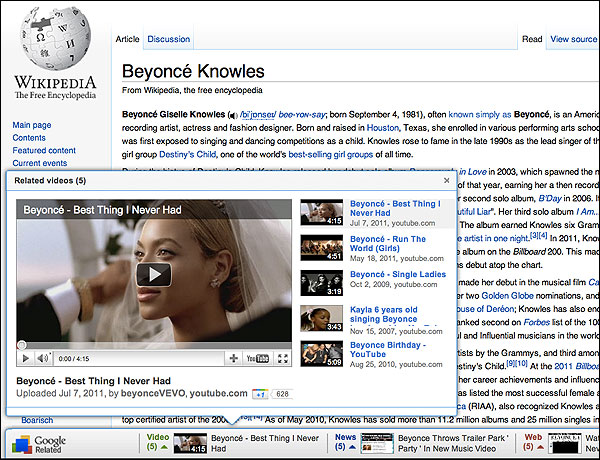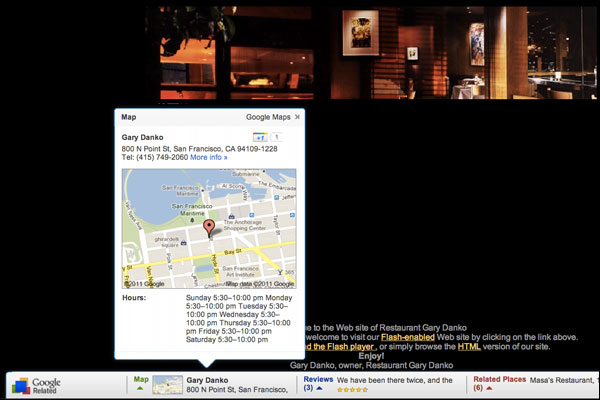New: “Google Related” Toolbar Shows Google Content As You Surf
Google has just released a new info discovery tool named Google Related that allows users to find and access content that’s similar to what they’re viewing in their web browser. Before the brief overview below, we need to point out that we’re writing this post without having had an opportunity to actually use Google Related. […]

Google has just released a new info discovery tool named Google Related that allows users to find and access content that’s similar to what they’re viewing in their web browser.
Before the brief overview below, we need to point out that we’re writing this post without having had an opportunity to actually use Google Related. In other words, we’re reporting on what we saw in a demo and in screenshots.
How Google Related Works
If related material (websites, videos, products for sale, maps, etc.) is available (as determined by an algorithm) it can be viewed in a toolbar found at the bottom of the web browser window. The related material will come from or via a number of Google web sites and properties.
Here are a few examples of the types of material Google Related can provide:
1. You’re looking at the Wikipedia entry for Beyoncé. Inside the Google Related toolbar you might find her music videos, recent news about her and/or web pages about her.
One thing we like about Google’s new service is that the video content it brings back (via YouTube) can be viewed in a pop-up window attached to the the actual Google Related toolbar. In other words, you don’t have to leave the web page and open a new tab or window. In fact, all of the content Google related provides does not require a new window or tab.
2. You’re looking at a web page for a restaurant you’re considering dining at for a your friend’s birthday dinner. This time, Google Related brings back a map of the area where the restaurant is located, reviews, and other “related” restaurants that might be worth a look. So, without having to be on the actual Google Places page for the restaurant users still can easily and quickly access the same info.
3. You’re doing a a price search for a new smartphone on Amazon. Google Related provides comparison pricing data, related products, and video demos.
To see a bit of Google Related in action, Google has a short demo available on YouTube.
Potential Benefits Of Google Related
The potential benefits for the searcher are saving time, effort, and being able to quickly see if they might have missed something from a source (or a Google property) they might have missed or did not know about.
For Google it means that users will spend more time using Google’s services. Of course, it would be possible to monetize the actual Google Related toolbar.
What We Would Like to See
As the amount of data on the Internet continues to explode tools like Google Related have a lot of potential to save users a lot of time especially if the related algorithm works well. One thing that would help Google Related go to the next level is allowing users to plug-in a variety of databases from many providers. For example, a college student might be able to include full text results from their e-text books from a database of archived journals and newspapers.
Of course, with Google being involved in a wide (and expanding) number of products and companies these days, we also need to see what type of coverage that can generate for Google Related.
Google Related & Browser Compatibility

We do not know if or when versions for these browsers will be available. Given that Google announced that they’re ending support for their Firefox search toolbar last month, we’re not holding our breath.
The Return Of Contextual Search?
While Google Related is brand new, this type of search — sometimes referred to as contextual search or real-time contextual search — has been around for more than a decade providing a variety of related info from a variety of disparate sources.
Although previous attempts at this type of search and search tools have not been “the next big thing,” perhaps the time is right to give it another try? We will have to wait and see not only the value that the Google Related technology can provide but also if Google makes an all out effort to market the product.
As with many Google services there are also enterprise possibilities for Google Related technology. For example, a searcher starts with a Google search and then begins reviewing results. As they look at different pages, related results from both other open web, fee-based, and local databases appear.
Old is New Again: A Bit of Contextual Search History
For the web search historians out there, here are a few of the context search products we’re talking about. Most were around in the the late 1990s or early 2000s.
- Flyswat
- Atomica/GuruNet
- Watson (Watson was also part of the MSN Toolbar beginning in 2005)
- Zapper
Google Related was developed by Google’s R&D Center in Israel. The person in charge at the center is Yosi Matias who was the Chairman, CEO, Co-Founder of Zapper, a company that was doing contextual search in the late 1990s. Here’s a paper on contextual search by Mattias and his colleagues at Zapper: Placing Search in Context: The Concept Revisited. The paper was presented at WWW10 in 2001.
Learn More
In addition to releasing the toolbar, Google’s also released a video explaining more about how it works:
[youtube width=”560″ height=”349″]https://www.youtube.com/watch?v=r4rlWygcJqI[/youtube]
Contributing authors are invited to create content for Search Engine Land and are chosen for their expertise and contribution to the search community. Our contributors work under the oversight of the editorial staff and contributions are checked for quality and relevance to our readers. The opinions they express are their own.
Related stories


